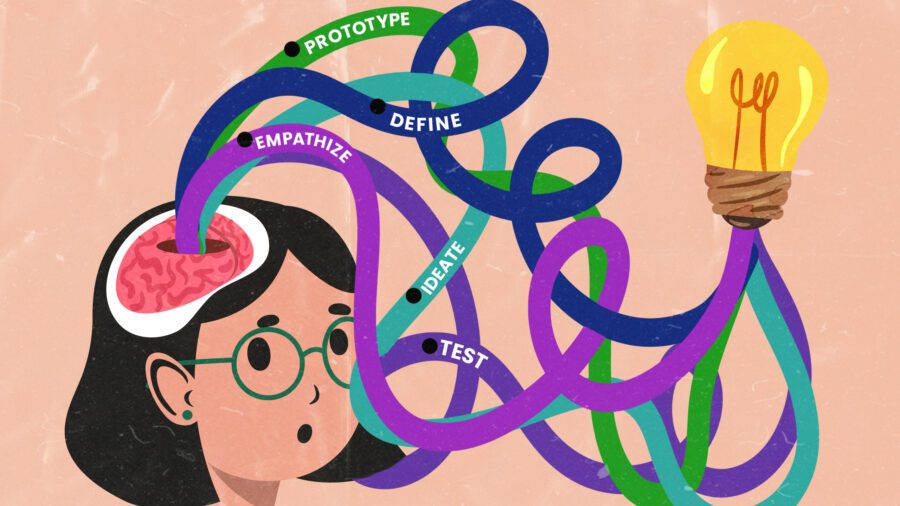
11 of Our Favorite 5-Minute Journal Prompts to Start Your Inner Work Journey & Pursue Healing
Think back to when you were a child navigating through the complexities of life.
Imagine you’ve just endured a long school day, and on top of having a huge stack of homework to get through before bed, you had to eat alone during lunch period because your usual table was full. How do you work through such a tremendous upset in your young social life?
Many kids take their thoughts and worries to the pages of a diary, writing down how they feel about their lives and their surroundings whenever they feel the need to. Maybe you kept a secret diary under your mattress — a safe space free of judgment in which you confessed your deepest secrets and fears. As a child, it feels good to get those feelings out, and it provides your young mind with a sense of clarity.
It’s common for many people to cease this practice once they enter adulthood, but the concept and benefits still apply. Today, it’s called journaling and is simply the practice of writing out your thoughts and feelings to better understand them and work through them. It can be a useful tool for anyone, but particularly for those who struggle with anxiety, depression, or healing from trauma. Journaling can help you gain perspective and clarity and improve your overall mental health.
If you’ve been curious about journaling in the past but haven’t done it yourself, you’re in the right place. In today’s article, we’ve put together our 11 favorite easy journal prompts to start your day off right and help you heal and achieve inner wholeness.
Why You Should Journal
Writing in a journal regularly is a common form of therapy in many different areas of study and mental health practices. Not only is it easy to do, but it can also help people dealing with a wide range of mental health concerns.
Journaling for Anxiety
Patients suffering from anxiety have shown positive results from journaling in part due to a more positive emotional reaction to stress and a greater acceptance of negative feelings. Keeping a journal for more than 30 days may additionally enhance the good effects on mental health.
Journaling for Depression
Evidence from research literature suggests that keeping a gratitude or expressive writing journal can be a useful mode of therapy for reducing depression symptoms in individuals undergoing therapy.
It was shown that, similar to anxiety treatments, the longer the duration of these programs, the better they worked. When you make gratitude a daily habit, you not only focus on the positivity in your life instead of the negativity, but you also rewire your brain to a less depressive state.
Journaling to Manage Stress
Writing in a journal has been shown to help with coping and lessen the effects of stressful experiences, which can help people avoid burnout and manage stress. Research has shown that putting one’s thoughts and feelings down on paper in a private setting can help alleviate emotional suffering.
We may be more likely to reach out to friends and family after writing down our feelings in a journal as a means of stress relief. Because of this, one’s emotional health improves, and their stress tolerance grows.
Journaling to Meditate
It’s hard to see things clearly when we’re under pressure or preoccupied with negative thoughts. Keeping a journal can provide the mental separation from our lives that is necessary for gaining perspective on our past, present, and future. Writing in a journal may provide enough insight to help us gain the objectivity and resolve to make necessary changes in our lives.
Journaling to Heal From Trauma
Healing is hard, but regardless of the severity of the trauma you’ve experienced, journaling can help you recover. Recently, it has been discovered that expressive healing, such as creative writing, can help mend both mental and physical health. The ability to journal anywhere is one of its many appealing features.
Journaling has also been linked to improved memory and concentration, reduced stress, and a stronger immune system. There is evidence that journaling can help alleviate PTSD symptoms, including anger, anxiety, and other physical symptoms like bodily tension and concentration, even in persons who suffer from the condition.
If you can make sense of what happened to you, you can lessen the impact of the trauma and move forward with your recovery more quickly. By keeping a journal, trauma survivors can learn to manage their symptoms and eventually move past them. Even after experiencing trauma, you can promote healing and positive change in your life by keeping a journal and incorporating prompts.
Tips on Getting Started
Though it may seem simple on paper, getting in the right mindset to journal effectively can be challenging. First, you’ll want to find a peaceful spot to sit and a time when there will be few interruptions. You can use your journal at any time, whether it’s on the bus to work, during lunch, or right before bed, so it may serve you to carry your journal with you if you can.
Before starting to write in your journal, it’s a good idea to relax for a bit. Give yourself permission to reflect on how you’re feeling. When you’ve finished writing for the day, evaluate how you feel. Keep an eye on how your feelings and thoughts evolve after you finish writing in your notebook. Don’t stress too much about correct grammar and spelling — you’re not going to publish this. Instead, focus on writing down your honest feelings and thoughts.
You should make an effort to be as specific as possible while journaling. Include your internal mental processes and reflections in your writing on emotional experiences. In what ways do your actions reflect the emotions you’re feeling?
One of the main objectives of keeping a journal is to record your thoughts and feelings so that you may reflect on how you’ve evolved as a person through time. That being said, treat your mental processes with kindness. Do not censor your thoughts as you write, and don’t rush to finish. Before starting to write about your experiences, give some thought to the prompts you’ll be utilizing.
Join In 200 Million+ On The Journey to Greatness
Prompt #1: Focus on Overcoming Life’s Challenges
You have changed significantly during the past year, month, and even week. You never stop growing. Life is constantly bringing new experiences. That’s life. Even the most challenging times in your life will one day be remembered with fondness for the growth they fostered in you.
Currently, what are you finding most difficult to accomplish or handle? What is the small but fundamental part of this struggle?
Prompt #2: Express Your Gratitude
It’s always possible to find the good in any situation, even if you’re in a dark moment in life. You can decide to view the world with optimism and accept whatever comes your way with grace. The degree of contentment you feel within is directly related to the way you think about things.
If you really wanted to be grateful right now, what’s one thing you might be thankful for?
Prompt #3: Find Acceptance
Your ability to make decisions in the present and future will be clouded by your inability to let go of the past and the words and emotions that accompanied them. Understand this. The present is more significant than the past.
Is there anything that you continue to refuse to accept? What steps can you take immediately to help your mind adjust to this new reality?
Prompt #4: Evaluate Your Daily Life
If a flower isn’t blooming as it should, it’s not the flower’s fault; rather, it’s the environment it’s in. The same is true for YOU. You can’t get well if you stay in the same place you fell ill. Recognize and value this fact, and put out your best effort to immerse yourself in environments that inspire you to excel. Exude nothing but positive energy and good will from the inside out.
What effects does your daily life have on you?
Prompt #5: Create Breathing Room
The balance between work and rest is essential. It’s tempting to try to cram as much work into each available hour as possible, but working long hours will lead to burnout. Take some breathing room. Rest between work is as significant as the work itself.
At this point in your life, your primary objective is to simplify your life so that you may devote more time and energy to the things that really matter to you. Cultivate a life that isn’t characterized by continual activity, haste, and stress but rather by reflective thought, the opportunity to create, and meaningful engagement with the people and endeavors that matter most to you.
How can you allow yourself a bit more breathing room on a daily basis to ensure that you’re making the best choices?
Prompt #6: Speak Your Truth
It is acceptable to say “no.” Raise your hand. Speak your truth. Ask questions. Believe otherwise. Set your priorities. Learn from your errors. Accept and celebrate your flaws. Forgive and seek forgiveness. Restart stronger than before.
What would you do differently if you knew no one would judge you?
Prompt #7: Analyze Your Actions
Your decisions determine a large portion of your life. If you don’t like something about your life, it’s time to make some changes and scout new options. It’s also fine to keep it low-key. You are not required to post everything on social media. Move quietly and let your actions speak for themselves.
What do your most recent acts indicate about your priorities? What kind of subtle improvement do you want to achieve in your life by the end of the month?
Prompt #8: Eliminate Unhealthy Distractions
Unhealthy distractions may entertain you now but will harm you later. Don’t settle. Don’t sacrifice what you want most for what’s easiest right now. Examine your routines and habits. Determine where your energy is going and eliminate distractions. It’s time to get back to business.
What is one unhealthy distraction that has recently gotten the best of you?
Prompt #9: Reconnect With Your Center
When you understand how to master your focus, you become a true master of your life. Consider what you devote your focus to. Rise beyond the pettiness that is attempting to entice you. Concentrate on what is important. Energy flows where attention goes, and things grow where energy flows.
What is truly important to you right now?
Prompt #10: Celebrate Past Achievements
Nothing substantial happens overnight. True advancement requires time. Don’t give up because you haven’t seen the fruits of your labor yet. It can take months of attention and dedication to see tangible results. You must believe even if the immediate benefits are not obvious to the naked eye.
What is something huge you’ve done recently that felt impossible at first?
Prompt #11: Love Yourself
Simply breathe, be, and pay attention to what it’s like to be you right now. Nothing needs to be fixed. Nothing is going to change right now. There is nowhere else to go. Just you, breathing and being present and without judgment. You are always welcome in this space. This is your space. You are sufficient.
What aspect of yourself do you need to embrace more honestly and lovingly today?
Healing and Wholeness Through Daily Journaling
Now that you understand all of the benefits that journaling can bring into your life, all that’s left is to run with one of these prompts and try it out for yourself.
Remember, change doesn’t happen overnight, and sometimes it takes dedication and commitment to see the results you want. If you find journaling hard at first, do your best to stick with it for at least 30 days. If you manage that, you’re sure to reap the benefits of daily journaling!
Greatness Authors
Greatness Authors is a collection of writers, thinkers, curiosity experts, and students of the world who are committed to bringing you the most up-to-date, impactful, and inspiring information surrounding Greatness topics.

Redefining Poetry: How Instagram Sensation Rupi Kaur Showed That Poetry Is for Everyone

The Young Professional’s Guide to Advocating for Yourself at Work & Setting Healthy Boundaries

Olympian Yusra Mardini’s Incredible Story of Resilience, Rescue, and Refugee Rights

A Beginner’s Guide to Effortlessly Attracting Money and Growth Opportunities

Psychologist Edith Eger’s Inspirational Journey to Find Forgiveness and What It Means for You










